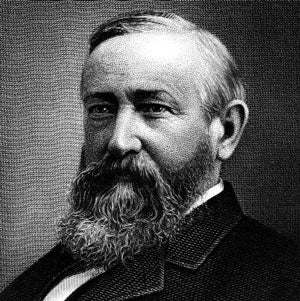Benjamin Harrison
23rd president - 1889-1893

A great-grandson of the Benjamin Harrison who signed the Declaration of Independence, and a grandson of the William Henry Harrison who served briefly as president in 1841, Benjamin Harrison, a former lawyer from Indianapolis, was more notable for his political pedigree than for his personal charisma. Stiff, formal and intolerant of others' failings, he hated small-talk and was known as the "human iceberg". But he was a good public speaker, and rose to the political heights with relative ease.
He won the presidency despite winning 100,000 fewer votes than Grover Cleveland, carrying the Electoral College by 233 to 168. The Republican powerbroker Matt Quay later remarked that Harrison had no idea "how close a number of men were compelled to approach the gates of the penitentiary to make him President".
Tied down by pledges that his supporters had given on his behalf, Harrison proved ineffectual in office. He allowed Congress to pass the controversial McKinley Tariff, which set rates higher than ever, and the Sherman Silver Purchase Act, which undermined confidence in the gold standard. Annual federal spending reached $1bn for the first time.
He built up the navy, opened up the Oklahoma Territory to settlers, saw six states (North Dakota, South Dakota, Montana, Idaho, Wyoming and Washington) admitted to the Union and, with the massacre at Wounded Knee, brought the Indian Wars to a brutal end. He also signed the Sherman Anti-Trust Act "to protect trade and commerce against unlawful restraints and monopolies".
But he could not solve the problem of the tariff rate (which at beginning of his tenure was generating an embarrassing Treasury surplus), and Democrat jibes about the "Billion Dollar Congress" fuelled a widespread sense that he was mismanaging the nation's finances. As the Treasury surplus vanished and economic storm clouds gathered, Harrison lost the confidence of his party leaders and, although he was renominated in 1892, he lost to Grover Cleveland. He did little active campaigning on account of the illness of his wife, who he died two weeks before the election. Harrison retired to Indianapolis, where he re-married, wrote, taught and practised law until his death, from influenza, in 1901.
In his words
"No other people have a government more worthy of their respect and love or a land so magnificent in extent, so pleasant to look upon, and so full of generous suggestion to enterprise and labour."
In others' words
"A cold-blooded, narrow-minded, prejudiced, obstinate, timid old psalm-singing Indianapolis politician." Theodore Roosevelt
Minutiae
His second wife, Mary, was his first wife's niece and she had formerly worked for his first wife as an assistant in the White House.
Electric lights were installed in the White House during his term of office. However, he and his wife were afraid to touch the switches, so they would often sleep with the lights on.
He was the first President to attend a baseball game. He saw the Cincinnati Reds beat the Washington Senators 7 to 4 on June 6, 1892.
He was the last US president to have a beard.
He was the first president to have his voice preserved for posterity: in an 1889 wax phonograph recording.
Join our commenting forum
Join thought-provoking conversations, follow other Independent readers and see their replies
Comments
Bookmark popover
Removed from bookmarks